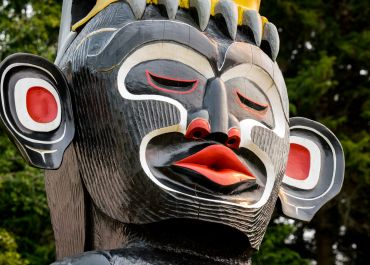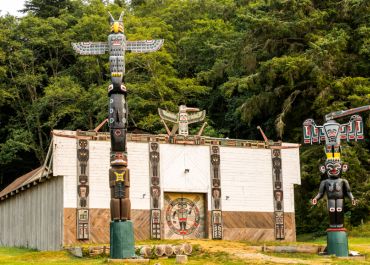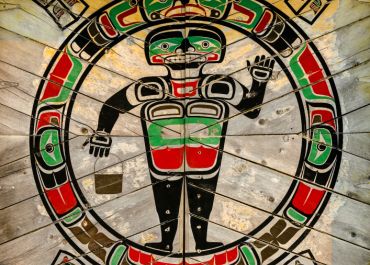Indigenous culture
 |
 |
 |
Just minutes away from Berry Island and Farewell Harbour Lodge are 2 Indigenous village sites, rich in cultural vitality. To the north via Village Channel lies the ancient village of 'Mimkwamlis of the Mamalilikulla First Nation. To the south, on Harbledown Island, lies the Da'naxda'xw First Nation village of Tsatsinukwomi.
Both the Mamalilikulla and Da'naxda'xw Nations are part of the Kwakwa̱ka̱ʼwakw, or Kwak'wala speaking people in the region around northern Vancouver Island who have a millennia old connection to the land and waters around us.
As a non-Indigenous owned business operating in the heart of Kwakwa̱ka̱ʼwakw territory, Farewell Harbour strives to conduct our business with respect to all Nations and their traditional territory. Our lodge is located in Mamalilikulla First Nation territory and we operate under agreement with them. We embrace the spirit of reconciliation and The United Nations Declaration on the Rights of Indigenous Peoples.
Many of our guests coming from around the globe come to Farewell Harbour with an interest in learning more about the millennia old Indigenous history of the region. Although, as non-Indigenous guides, it is not our culture and history to share, we do offer visits to these two local villages to give our guests a sense of the culture's richness and vitality.
At Tsatsinukwomis, we are greeted by a local guide who gives us a sense of what everyday life is like in the remote village and will provide us with a tour inside the Big House, built by the Da'nada'xw patriarch William Glendale. Guests are always moved by the grace, hospitality and friendliness of our Da'naxada'xw guides. The village is currently home to several families who reside there year round.
At 'Mimkwamlis, the Mamalilikulla Nation are developing a 'Watchman' program and their staff may or may not be present during our visit as they may be busy conducting work in other parts of the territory. However, a stroll through the currently uninhabited village is to steep yourself in thousands of years of human presence. The village was the site of the last coastal potlatch in 1921. The potlatch, a ceremony central to all aspects of Kwakwa̱ka̱ʼwakw traditions, was outlawed by the Canadian government until the 1950s and many of the attendees at the 1921 'Mimkwamlis potlatch were arrested and their regalia confiscated.
Guests who would like to further deepen their knowledge of Kwakwa̱ka̱ʼwakw culture are encouraged to participate in tours offered by local Indigenous tour operators.
